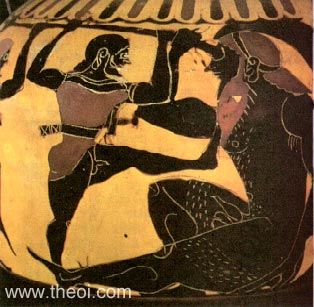
You may know Internet celebrity Tucker Max as the connoisseur of all that involves drinking to excess, destroying public property, and engaging in ill-conceived hookups with women of questionable moral virtue.
This much is true. However, you may not know Tucker Max as a wide admirer of the classics of Ancient Greece and Rome (as am I). I mean, who else, after drunkenly backing some chick's car into a donut shop, would run from the police and compare the ordeal to that of Phedippides at Marathon?
Indeed, Tucker Max's recommended reading list includes many classical favorites, such as the History of the Peloponnesian Wars. He recommends that everyone read, and read voraciously, particularly from the classics. After all, there's nothing that you will go through in life that hasn't been experienced by someone in literature.
One classic character who has many ordeals relevant to modern-day audiences is Odysseus. Odysseus left his home in Ithaca to join King Menelaus' fight against the Trojans in Asia. After ten years of war, Odysseus finally devised the strategy of the Trojan Horse, allowing the Greeks to sack Troy. However, during his voyage home, Odysseus did not have the favor of Poseidon nor of Helios (sea and sun gods, respectively), and he was constantly delayed on his journey back to Ithaca for another ten years. During Odysseus' twenty years away from home, his wife Penelope was courted by dozens of suitors--a story which is all too familiar to generations of American service men. (Fortunately, Odysseus' revenge upon the suitors only manifests itself extremely rare instances...)
Kings of War gives us a link to a story in USA Today concerning Soldiers from the 10th Mountain Division learning a lesson from a two more Greek heroes of the Trojan War--Ajax and Philoctetes. Ajax was the cousin of Achilles, and fought alongside Achilles, Odysseus and the other Greeks during the Trojan War. He was reportedly schooled by a centaur in his youth. (For those of you who remember your Machiavelli, this represents the fact that he was both a scholar and a warrior). Philoctetes was bitten by a snake while traveling to the Troy to fight in the Trojan War, and was abandoned by Odysseus on an island.
Soldiers in the 10th Mountain Division were introduced to the story of Ajax and Philoctetes while attending a program known as the Philoctetes Project. In this project, actors perform Sophocles' 5th Century BC plays about these two Greeks for an audience of Soldiers.
Philoctetes was physically wounded, while Ajax suffered psychological wounds from the Trojan War. Both plays are being performed for Soldiers who have been wounded in battle, or are suffering from what we now call Post Traumatic Stress Disorder, reminding us that this condition is by no means a recent invention, but has been around for thousands of years. They are also being performed for military leaders in order to give them a perspective of how deep this problem has run throughout history.
After nine grinding years of war, the once-mighty soldier abruptly comes unglued. Denied an honor he thinks he's due, he goes to kill the officers he holds responsible, but after his night of rage finds he has slaughtered barnyard animals, not generals.Focus: I love reaching back into classical literature to bring out lessons for real life, even if it is admiration for Ovid's outrageous stories of copping a feel on some young lady in the Roman Coliseum.Shamed beyond endurance, he plans suicide. "A great man must live in honor or die an honorable death," he tells his wife. "That is all I have to say."
The soldier is Ajax, fighter of the Trojan War, his downfall portrayed in a Greek tragedy written more than two millennia ago.
To 1st Sgt. Stanton Brown of the U.S. Army's 10th Mountain Division, watching a performance of the play last week in a bar on an Army post, the plight of Ajax is a story from his own life: In January, he lost his best friend, a man under his command, to suicide two months after their return from Iraq. It was the dead soldier's third deployment in five years. Like Ajax, Brown says, "he had been so stressed for so long."
The program, Theater of War, was conceived last year by Bryan Doerries, a New York theater director and classicist. It's funded by Respect-Mil, a Walter Reed Army Medical Center program designed to teach primary-care doctors and families how to recognize signs of significant depression and where to get help.
It was brought to Fort Drum — for the first performance on a military base — by 10th Mountain Division brass intent on getting soldiers to recognize the issue of post-traumatic stress disorder and how it affects their families on their return.
"We're calling it PTSD now … but it's timeless," Gen. Kevin Mangum tells the audience of brigade commanders and their spouses. "Ajax's ego drove him to his 'divine madness.' … I know a hell of a lot of Ajaxes out there."
A USO show it's not: One play is about a wounded soldier abandoned by his fellow troops and another about a warrior chief who goes mad and kills himself despite the pleadings of his wife. Ajax, says his wife, "sits shell-shocked in his tent, glazed over, gazing into oblivion. He has the thousand-yard stare."
What other classics from Greece and Rome speak to modern-day audiences?
2 comments:
Dude,
After informing my wife that I'd be returning from a six-month deployment to take five (5) days of leave before departing for 15 mos on this current gig, the only classic that speaks to me is Lysistrata...dammit.
Post a Comment